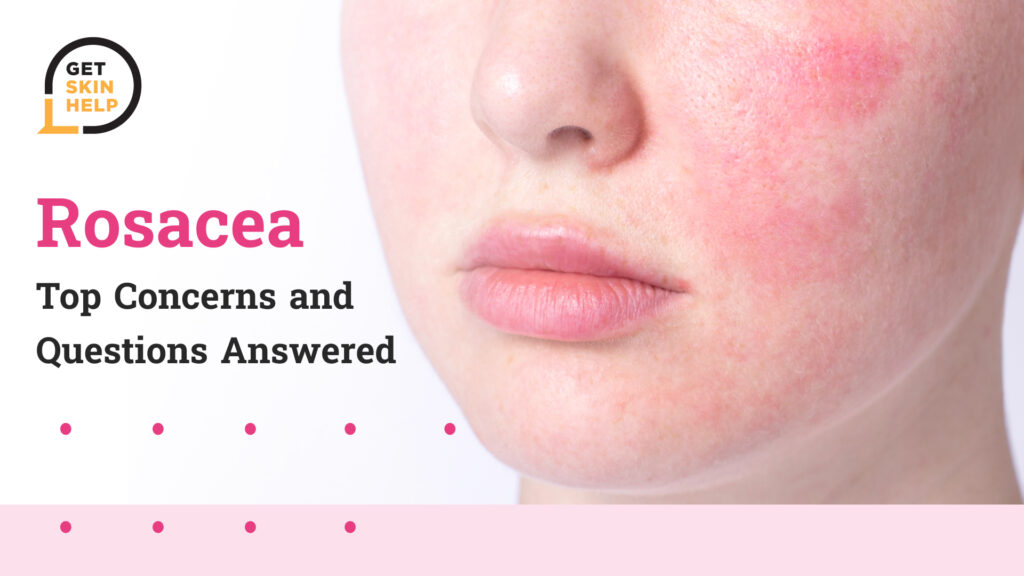
Are you dealing with persistent facial redness, bumps, or sensitivity? You might be one of the millions affected by rosacea. This chronic skin condition can be confusing and frustrating, but understanding it is the first step to finding relief. Let’s explore the top concerns and questions about rosacea, based on scientific evidence and experiences shared by Canadians.
What Exactly is Rosacea?
Rosacea is a chronic inflammatory skin condition primarily affecting the Centre of the face. It’s characterized by persistent redness, visible blood vessels, and sometimes acne-like bumps. While it’s more common in fair-skinned individuals, rosacea can affect people of all skin tones.
Top Rosacea Concerns and Questions
1. What Causes Rosacea?
The exact cause of rosacea is still unknown, but genetics seem to play a role. People with family members who have rosacea are more likely to develop it themselves. Rosacea is often called the “Curse of the Celts” because it tends to affect people with ancestry from Celtic regions, such as Ireland and Scotland, who typically have fair skin. Researchers have also found that rosacea may be linked to an overactive immune system and increased production of a chemical called cathelicidin, which can cause redness and inflammation in the skin.
2. What Are the Symptoms of Rosacea?
The most common symptoms include:
- Facial redness (erythema)
- Visible blood vessels (telangiectasia)
- Flushing
- Acne-like bumps (papules and pustules)
- Skin thickening, especially on the nose (phymatous changes)
- Dry, flaky skin
- Burning, stinging, or itching sensations
3. Is Rosacea Contagious?
No, rosacea is not contagious. It results from a hereditary tendency and an exaggerated immune response to normal external triggers.
4. Does Rosacea Go Away?
Rosacea is a long-term skin condition that can come and go, with symptoms often flaring up due to specific triggers. While there is no permanent cure, most people can successfully manage their symptoms with the right treatments and lifestyle adjustments.
5. How is Rosacea Treated?
Treatment options include:
- Topical medications: Ivermectin, metronidazole, and azelaic acid
- Oral medications: Low-dose doxycycline for its anti-inflammatory properties
- Laser and light therapies: To reduce redness and visible blood vessels
- Lifestyle changes: Identifying and avoiding triggers
Managing Rosacea: Tips for Success
- Identify and avoid triggers: Common triggers include spicy foods, hot drinks, alcohol, sun exposure, and stress.
- Protect your skin: Always wear a broad-spectrum, mineral-based sunscreen.
- Use gentle skincare: Opt for mild, fragrance-free products specifically formulated for sensitive skin.
- Stay cool: Avoid overheating and use a fan if needed.
- Manage stress: Try relaxation techniques to reduce stress-related flare-ups.
The Impact of Rosacea on Quality of Life
Rosacea can significantly affect a person’s emotional health and quality of life. Many people with rosacea report feeling self-conscious about their appearance, which can affect their confidence and social interactions.
When to Seek Professional Help
If you’re experiencing persistent facial redness, flushing, or other symptoms of rosacea, it’s best to consult a healthcare professional. Early diagnosis and treatment can help prevent the condition from worsening and improve your quality of life.
GetSkinHelp: Your Partner in Rosacea Management
Living with rosacea can be challenging, but with the right knowledge and care, it’s possible to manage symptoms effectively. If you’re in Canada and looking for personalized advice and treatment for your rosacea, consider booking an appointment with GetSkinHelp.
GetSkinHelp is an online platform that allows you to connect with licensed healthcare practitioners through convenient video appointments. Our experienced professionals specialize in skin conditions and can provide expert guidance tailored to your specific needs.
Through a GetSkinHelp consultation, you can:
- Receive a professional assessment of your rosacea
- Get answers to your specific questions about the condition
- Discuss the latest treatment options available in Canada
- Develop a personalized management plan
Don’t let rosacea control your life. Take the first step towards clearer, calmer skin by scheduling a consultation with GetSkinHelp today. Our experienced practitioners are ready to help you navigate your rosacea journey and find the most effective solutions for your skin, in line with Canadian healthcare guidelines.
Remember, while rosacea is a chronic condition, with proper management and care, you can significantly improve your skin’s appearance and your overall quality of life. Book your appointment with GetSkinHelp now and take control of your skin health!
References:
- Gallo, R. L., Granstein, R. D., Kang, S., Mannis, M., Steinhoff, M., Tan, J., & Thiboutot, D. (2018). Standard classification and pathophysiology of rosacea: The 2017 update by the National Rosacea Society Expert Committee. Journal of the American Academy of Dermatology, 78(1), 148-155. https://doi.org/10.1016/j.jaad.2017.08.037
- Tan, J., & Berg, M. (2013). Rosacea: Current state of epidemiology. Journal of the American Academy of Dermatology, 69(6 Suppl 1), S27-S35. https://doi.org/10.1016/j.jaad.2013.04.043
- Two, A. M., Wu, W., Gallo, R. L., & Hata, T. R. (2015). Rosacea: Part I. Introduction, categorization, histology, pathogenesis, and risk factors. Journal of the American Academy of Dermatology, 72(5), 749-758. https://doi.org/10.1016/j.jaad.2014.08.028
- Van Zuuren, E. J., Fedorowicz, Z., Carter, B., van der Linden, M. M., & Charland, L. (2015). Interventions for rosacea. Cochrane Database of Systematic Reviews, (4), CD003262. https://doi.org/10.1002/14651858.CD003262.pub5
- Weinkle, A. P., Doktor, V., & Emer, J. (2015). Update on the management of rosacea. Clinical, Cosmetic and Investigational Dermatology, 8, 159-177. https://doi.org/10.2147/CCID.S58940

